J. Pepper Bryars: Cancel culture comes to conservative country
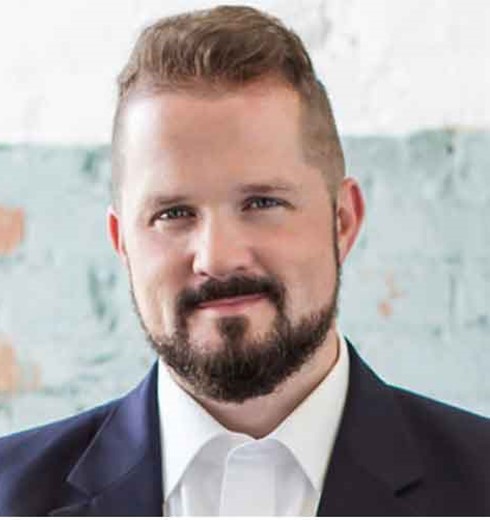
The true crime of a censor isn’t muzzling someone’s mouth. It’s muffling everyone else’s ears. That lesson and many others on the importance of free expression and the exchange of ideas were lost recently when Samford University in Birmingham relented to the joint demands of an online petition and its Student Government Association to disinvite historian Jon Meacham from speaking about American history during inauguration ceremonies for the school’s new president. Meacham is well-known for his presidential biographies, and he won the Pulitzer Prize in 2009 for writing American Lion: Andrew Jackson in the White House. But the crime that got him canceled in conservative country? From the petition: “Jon Meacham is significantly involved with the Planned Parenthood organization. He has spoken at their fundraising events, his book is used for the Planned Parenthood fundraiser, and overall his beliefs and core values do not align with those of Samford University, as it is a Southern Baptist institution.” It’s no surprise that Meacham is liberal and pro-choice. Anyone who has ever seen him on cable news mixing his historical perspectives with his personal political preferences knows that. But it’s disheartening to see a conservative campus community adopt the Marxist tactics of the left (and of the Pharisees, by the way) by insisting that unless you share all of their beliefs, you’re unwelcome in their midst, even if only to share your views on an unrelated issue, even if only as a guest, even if only to break bread for an evening. Have we really reached the point in America, and in academia most alarmingly, where in order to gather to discuss a topic, everyone present must already agree on everything? Can we not see that this is a blueprint for ignorance? Meacham wasn’t coming to one of the most conservative campuses in the Bible Belt to advocate for abortion rights. While he is indeed pro-choice, and while he did speak at a Planned Parenthood event, abortion policy isn’t his stock-and-trade. He’s a historian, and as the university noted, his lecture was going to flow from his latest book, The Soul of America: The Battle for our Better Angels, which is, rather ironically, about how our nation has overcome periods of deep, sometimes violent, political and cultural division. But since Meacham’s also pro-choice (along with half of our country, sadly), the petitioners and SGA representatives presumably think he’s not worth hearing from, and also by extension, half of our country isn’t worth hearing from, or talking to, or treating with the same courtesy we’d want from people who hold different beliefs from our own. To place the petitioner’s argument in its best and strongest light, they’re concerned that by giving someone a platform to speak on their campus about American history, who has also been involved with events elsewhere promoting abortion rights, it significantly tarnishes the strong, Christian reputation of Samford and weakens its ability to fulfill its mission. Maybe so, in the minds of some. But if you’re okay with that logic, then you’d also have to be okay with someone who happens to be pro-life being canceled from speaking where their values “do not align” with whatever progressive institution to which they may be invited to speak on an unrelated topic. You’d also have to be okay with Brandeis University disinviting Ayaan Hirsi Ali from its campus because, as a survivor of female genital mutilation and the target of Muslim terrorists, she’s a critic of Islam. You’d also have to be okay with the City of Atlanta sacking its fire chief, Kelvin Cochran, after he wrote about his traditional beliefs on marriage and sexuality in a book for his church’s Bible study class. And you’d also have to be okay with Massachusetts Institute of Technology canceling a lecture from Dorian Abbot, a professor of geophysics at the University of Chicago, simply because he supports merit-based college admissions rather than race-based standards. Canceling someone because they don’t “align” with your tribe is exactly what the far left is doing all across America — in schools, universities, workplaces, clubs, even on sports teams — and their quest for purification and uniformity is making everybody angrier, meaner, and in the end, dumber. And it has to stop. J. Pepper Bryars is a conservative opinion writer from Mobile who lives in Hunstville. Readers can find him at https://jpepper.substack.com.
Alabama local/state Coronavirus updates (March 12)

This is our third in a series of collective Coronavirus (COVID-19) updates from around the state. You can find the first here and the second here. This update includes statements from Secretary of State John Merrill, the state senate, and from Auburn University and Samford We will update this post throughout the day as more notices become available. For up to the minute and detailed information from the Alabama Department of Public Health please visit their resource center here. For information from the Center for Disease Control that includes mitigation strategies visit their website here. Download full CDC Mitigation Strategy pdf here. Download CDC at home care guidance for those who have coronavirus but do not require hospitalization here. As of 2:40pm central there are still no confirmed cased of coronavirus in Alabama. However, the big caveat to this is also that there has been limited testing. State Senate: On Thursday the Alabama Senate approved a $5 million supplemental appropriation to the budget to combat the spread of COVID-19, commonly referred to as Coronavirus, in Alabama. These funds will help supplement the Federal funding which totals $8.1 million to this date. The money is for health care professionals to use as they see fit to stop the spread of the disease in Alabama including helping set up local centers for testing, covering expenses related to telehealth and covering the costs for the uninsured for testing and treatment. Currently there have been no positive tests for Coronavirus in Alabama, however after meeting with professionals in the healthcare industry and public health officials, legislative leadership determined it was important to be proactive and work to get the situation under control should any tests in Alabama come back positive for the disease. Both Senate President Pro Tempore Del Marsh (R-Anniston) and Senate Majority Leader Greg Reed (R-Jasper) emphasized that if someone is not feeling well, they should contact their physician to administer next steps and determine if further testing is necessary. “I want to thank Governor Ivey and her team for taking this issue head on. One of the biggest problems we have seen from this disease is simply a lack of preparation,” Marsh said. “It is important for everybody to know that Alabama has a solid plan to combat Coronavirus. I cannot stress enough that if someone feels as though they need to be tested for Coronavirus they should contact their doctor to work through the next steps.” “Over the past several days legislative leadership has held a series of meetings with the Governor and her Coronavirus Task Force, as well as with health care professionals who are on the front lines of combating this pandemic,” Reed said. “It is important to know that we have test kits and tests are being administered and we have excellent health care professionals who are prepared to act. One important thing to note is that we are setting up the ability to contact doctors with telehealth so that next steps can be decided over the phone or video chat to limit the potential of exposure to this illness,” Reed said. “In response to the pandemic that has been going around the nation and the world, this supplementary spending bill is a way for the State of Alabama to be proactive and show our citizens that we are serious about fighting the spread of the coronavirus,” said Alabama Senate Minority Leader Bobby Singleton (D-Greensboro). “Although we have not had a positive test in the state, we understand that this highly contagious virus could be potentially deadly for those with compromised immune systems. Therefore, we are moving forward in setting up crisis centers to protect our citizens.” Auburn University statement: Auburn University will transition from on-campus instruction to remote delivery beginning Monday, March 16 and continue through April 10 in response to concerns about the spread of the coronavirus (COVID-19). University officials ask that students refrain from returning to campus after spring break. University officials will subsequently determine if students will return to campus for the remaining weeks of the spring semester. Auburn faculty will contact students on steps they should take to continue their academic coursework. The university will continue normal operations, although departments and units should utilize remote work and “social distancing” as appropriate. “The Auburn Family faces many unknowns about this virus,” said Auburn University President Jay Gogue. “We are taking these unprecedented steps based on our utmost concern for the health and well-being of Auburn students, faculty and staff. In the meantime, we continue working with public health and emergency preparedness officials to make decisions in the best interest of the campus community and to help stop the spread of COVID-19.” Other university actions: All university events, including sporting events, are canceled through April 10, ensuring appropriate “social distancing” and helping prevent the potential spread of the virus. All university domestic and international travel is suspended through April 10. Dining facilities, libraries and residence halls will be closed through April 10. University officials will make arrangements for international students and others who are unable to return home. Students who have specific questions should contact the Division of Student Affairs. Decisions have not yet been made on spring commencement, summer study abroad programs or other events and activities beyond April 10. The university medical clinic remains open. Those exhibiting COVID-19 symptoms should immediately call the Auburn Medical Clinic at 334-844-9825 before visiting the clinic. University officials will make arrangements for students who do not have access to the technology needed for remote instruction. Students who live on campus and believe it necessary to return to campus to collect personal items should first contact the Office of University Housing at housing@auburn.edu. John Merrill, Secretary of State: Our plan for changes in the elections process, if necessary, will be revealed at the appropriate time. Our intentions are to ensure a safe and secure election and provide accountable results in a manner that is transparent to the people of our state. We will continue to do so as we
Samford’s annual economic impact $424.8 million, study says
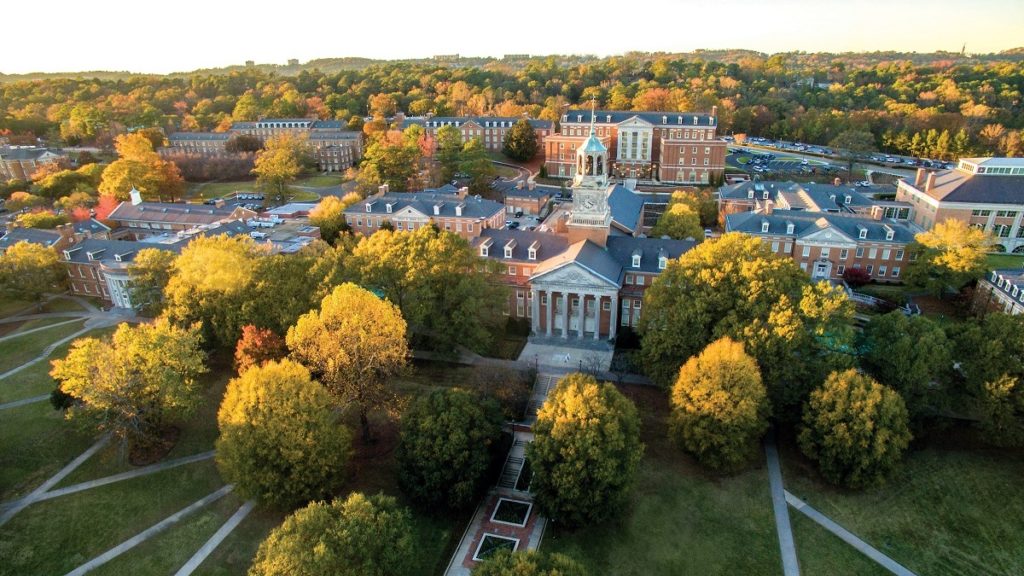
Samford University’s estimated annual economic impact on the state of Alabama is more than $424.8 million, according to a study released Wednesday. The independent study was conducted by Samuel Addy and Ahmad Ijaz with the Center for Business and Economic Research at the University of Alabama. For 2016-17, the most recent year for which complete data was available, Samford’s economic and fiscal impact was $424.8 million, 2,424 jobs and $16.1 million in state and local income and sales taxes. Betsy Bugg Holloway, Samford’s vice president for marketing and communication, said the report affirms the ways the university contributes to economic development through teaching, research and service. The majority of Samford’s impact – $384.1 million, 2,172 jobs and $5.2 million in local sales tax revenue – is in the Birmingham-Hoover metropolitan area. This includes an annual economic impact of $18.5 million from visitors to the university’s campus in Homewood. The university regularly hosts visitors from around the state, country and world to attend its athletics, arts and educational events. Samford University is a high-yielding investment for its students, a new report says. (Michael Sznajderman/Alabama NewsCenter) “Samford University is an attractive investment for its graduates and clearly contributes to the state of Alabama and the Birmingham-Hoover metro area economies,” the report states. “In addition, Samford provides many other public and private benefits that, while difficult to quantify, clearly make it a great asset for the state and the metro area.” The report also found that the state gains indirectly because Samford graduates pay higher taxes than they would have without their Samford degrees. “Over the working life of the 2016-17 graduating class, the Samford education will provide higher income that enables generation of $258.7 million additional income and sales taxes – $181.5 million in state sales and income tax collections and $77.2 million local sales taxes,” the report states. According to the study, “a Samford education is a very high-yielding investment for students.” The real annual rate of return on some college attendance is 7.1 percent over a high school graduate. The bachelor’s degree has a 9.2 percent real annual rate of return over some college attendance, and the master’s degree yields a 15.7 percent return over a bachelor’s degree. The doctorate provides a 12.2 percent marginal return over the master’s degree. About 39 percent of Samford students are enrolled in graduate and professional programs, Holloway said. New programs at Samford are preparing health and business students for fast-growing, in-demand career fields. (Samford University) The university has lasting impact on graduates and the general public through service and outreach programs. Through job creation, generation of tax revenues, promotion of innovation, assisting in business creation and growth and facilitation of economic development, Samford is making the metro area and the state “attractive for the startup, location and expansion of business and industry,” the study says. These benefits lead to improvement of workforce skills and the general quality of life, it says. In recent years, Samford has placed particular emphasis on developing new programs designed to meet the needs of today’s workforce. According to Holloway, new programs in the College of Health Sciences and an emphasis on data analytics throughout Samford’s Brock School of Business are equipping graduates to succeed in some of the fastest-growing and most in-demand career fields. “Samford’s commitment to developing new programs and evolving existing programs to meet the needs of our students, and the communities we serve, is undoubtedly a factor in Samford’s increasing economic impact,” Holloway said. An independent study conducted in 2014 found Samford’s impact for 2012-13 to be more than $335 million. A link to the full 2016-17 report is available on the Samford website. Republished with the permission of the Alabama Newscenter.
Five things you need to know about Brad Mendheim

The primary elections are over, but some highly sought spots still remain open due to the primary races resulting in runoffs. One of those races is for the Supreme Court, Place 1. Incumbent Brad Mendheim and Thirteenth Judicial Circuit Court Judge Sarah Stewart both garnered enough support to tip the race into a a runoff election set for July 17. With that in mind, here are five things you need to know about Brad Mendheim: 1. He was appointed by Gov. Kay Ivey to replace Justice Glenn Murdock. In January 2018, Mendheim was appointed by Governor Kay Ivey after Alabama Supreme Court Justice Glenn Murdock announced his resignation. “In appointing someone to serve on the Alabama Supreme Court, it is imperative to appoint someone with impeccable legal credentials and with unquestioned character and integrity; Judge Brad Mendheim exceeds those requirements,” Ivey said in a news release. “With more than 17 years of judicial experience, Judge Mendheim will bring the valuable knowledge of a trial judge to the highest court in our state. As an Associate Justice of the Supreme Court, I know Judge Mendheim will follow the law and serve with honor.” 2. He has served as a judge for over 15 years. In 2001 Mendheim was elected to serve as district judge in Houston County, a position he held until 2008 when he was elected to serve as a circuit judge for the 20th Judicial Circuit covering the Henry and Houston Counties near the Georgia and Alabama state lines. He was then reelected in 2014 for another six year term before Ivey appointed him as a Supreme Court judge in 2018. 3. He’s presided over 300 jury trials. According to Mendheim’s campaign page, he’s presided over 300 jury trials and has twice been called upon to has been called upon to sentence men to death for their convictions for capital murder. He’s also presided over numerous cases of crimes against children, violent felonies, criminal cases, and small claims cases over the course of his career. “I’ve been a trial court judge for most of my career, and I look forward to bringing that experience to the Supreme Court, while working with my new colleagues to ensure justice is achieved in every case we hear,” Mendheim said when he was appointed to the Supreme Court. 4. He served six and a half years as an Assistant District Attorney Before he became a judge, Mendheim worked at a law firm in Dothan for several years. He was then given an opportunity to serve as an assistant district attorney for the 20th Judicial Circuit where he served for just over six years. “As a local prosecutor, he handled every type of criminal case, from the most minor traffic ticket to death penalty cases. Brad personally tried over 120 criminal jury trials, most of which were serious felonies and crimes of violence,” said Mendheim’s campaign page. 5. He was born in Dothan and still lives there. Born to the late Brady and Nancy Mendheim in Dothan, Ala. Medheim attended Auburn University to obtain his bachelors degree and Samford’s Cumberland School of Law for his J.D. But Mendheim had a love for his hometown, and returned after school to begin his career in law, and has spent 17 years serving the area as a judge.
Samford nursing program wins $2.1 million U.S. Department of Health and Human services grant
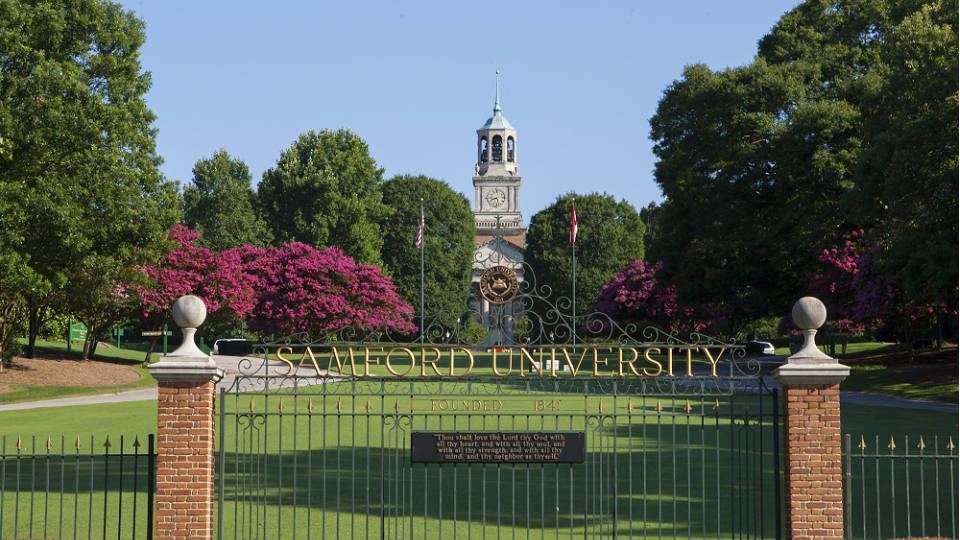
Samford University’s Ida Moffett School of Nursing has received more than $2.1 million to help make graduate nursing education more affordable for currently practicing or teaching nurses committed to careers in nursing education. Samford’s $2,140,611 Nurse Faculty Loan Program (NFLP) grant from the U.S. Department of Health and Human Services, Health Resources and Services Administration is the largest in the country and one of only three nationally that exceeds $1 million. This is Samford’s 16th year to receive funding for the program. According to Jane Martin, nursing school senior associate dean and project director of the grant, additional faculty are needed for nursing schools to increase student capacity. “The Nurse Faculty Loan Program is designed to help address the shortage of nurse educators. Students who receive loans for graduate degree programs can have up to 85 percent of the loan forgiven in exchange for service as full-time nursing faculty members at an accredited school of nursing,” she added. The Nursing Faculty Loan Program grants are intended to address the shortage of nursing educators by forgiving as much as 85 percent of a student’s loan for graduate nursing education in exchange for full-time work as a nursing educator. (Samford University) “The need for professional registered nurses is growing at a rapid pace, and faculty shortages in nursing schools are impeding our ability to address the increased demand,” said Nena F. Sanders, vice provost of Samford’s College of Health Sciences and nursing school dean. “It is projected that our country will need an additional 439,300 nurses by 2024.” The American Association of Colleges of Nursing found that nursing schools turned away 64,067 qualified applicants in 2016-17. Nearly two-thirds of the nursing schools responding to the survey pointed to a shortage of faculty and/or clinical preceptors as a reason for not accepting all qualified applicants into their programs. More than 92 percent of faculty vacancies were positions requiring or preferring a doctoral degree. “Since 2008, the NFLP has provided grants to eligible Samford students pursuing a Doctor of Nursing Practice (D.N.P.). These graduates are now serving in a variety of academic settings throughout the nation,” said Gretchen McDaniel, associate dean for graduate nursing program. According to McDaniel, students in a number of Samford’s D.N.P. options may be eligible for funding, including Bachelor of Science in nursing to D.N.P. nursing administration or nursing informatics and analytics; and post-master’s administration or advanced practice. The NFLP was approved by Congress in 2002, and Samford was one of the first 55 nursing schools from across the U.S. to receive funds. Samford’s NFLP grants now total more than $13.5 million. The 2018-19 grant is expected to help more than 150 students from 18 states in Samford’s Doctor of Nursing Practice program. To apply for admission to Samford graduate programs in nursing, go to https://www.samford.edu/nursing/graduate-nursing/. Republished with permission from Alabama News Center.
Women of Influence: U.S. Representative Martha Roby
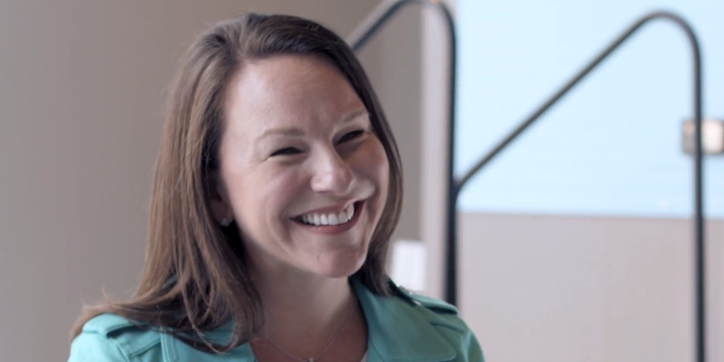
Arguably, one of the most politically influential women in the state, 2nd District U.S. Rep. Martha Roby has been hard at work; serving the state of Alabama, and the members of her district for fifteen years. Roby was born and raised in Montgomery Ala.. After receiving her Bachelors degree in music from New York University in 1998, she returned to the Yellowhammer state to pursue a law degree at the Cumberland School of Law at Samford University in Birmingham, Ala. Roby and her (now) husband Riley, were attending her younger brother’s graduation ceremony in Montgomery while she was in her third year at Samford, when the commencement speaker caught her attention. “He challenged the graduates not to contribute to Alabama’s ‘brain drain,’ a long-existing problem in which young, talented Alabamians leave the state to follow their ambitions elsewhere. ‘Invest in Alabama,’ he said. ‘Chase your dreams, but whenever possible, contribute to building up your home and making it a better place,’” Roby told Lean IN. “How many bright, talented individuals had we seen leave the state to pursue careers in so-called greener pastures? Montgomery and the State of Alabama had hard-to-fix problems. Would it make the difference if Riley and I, who care deeply about our home, put down roots?” Roby continued. “Ambition to follow one’s dreams is admirable, I thought, but so is realizing a responsibility to stay and help lift up a community. If we didn’t, who would?” After finishing law school, Roby’s mind raced with possibilities on how she could serve those in her community; and her opportunity came just a few short years later when a local city council member announced her retirement. She entered the race, and won the Montgomery City Council District 7 seat in 2003. A position she maintained until 2010, when she announced her run for U.S. Congressional District 2. Winning the race in 2010, Roby has since served her constituents in the 2nd District with an enthusiasm that’s hard to match. Roby is a former member of several congressional committees including the Subcommittee on Military Construction, Veterans Affairs and Related Agencies and currently serves as a member of the Judiciary committee, the Subcommittee on Commerce, Justice, Science, and Related Agencies, Subcommittee on Crime, Terrorism, Homeland Security, and Investigations, Subcommittee on Defense, Subcommittee on Labor, Health and Human Services, Education, and Related Agencies, and is the first representative from the 2nd Congressional District to serve on the House Appropriations Committee. She also serves on many non-legislative committees including the Caucus for Womens Issues, Congressional Army Aviation Caucus, Congressional Pro-life Caucus and the Congressional Air Force Caucus. Roby has been instrumental in bringing jobs, and investments to her district, including fighting to keep eight C-130 aircrafts at Montgomery’s Maxwell Air Force Base, and working in Congress to help the Army Aviation Center of Excellence at Fort Rucker avoid crippling budget cuts that would have decimated training capabilities. She has also been a proponent of Veterans Affairs and has worked tirelessly to address some of the misconduct at the Central Alabama Veterans Health Care System (CAVHCS). Roby is a women who has dedicated her life in-service to the state of Alabama. She works endlessly for those in her District and across the nation, and was kind enough to answer some of Alabama Today’s questions about her life, work and influences. How have other women influenced your success? I am blessed to have been surrounded by strong, driven women – my mom, my grandmothers, and others. Growing up, my dad always told me, “You can be anything you want to be.” I believed him, and I was fortunate to see this truth lived out by women in my life. What shaped your desire to work in politics? My husband Riley and I were sitting in the audience at my brother’s high school graduation, and the commencement speaker talked about the “brain drain.” He mentioned how important it is to go out into the world and do all the things you dream of doing, but then to return home to serve your community in whatever way you feel called. The challenge had a profound effect on both of us. Shortly thereafter I kicked off my first campaign in my hometown for the Montgomery City Council. Later, when my husband and I were debating and praying about whether or not to run for Congress, we sought the advice of countless people, many of whom had done this job before or were currently serving. I had a four-year old and a twelve-week old, and when asked, most people told me I shouldn’t run for Congress – that I wouldn’t be able to do it. Before officially announcing my bid for Congress, I visited Washington, D.C., and had the opportunity to sit down with my now great friend and colleague, Cathy McMorris Rodgers (R-WA). I told her my dilemma, and I told her that most people had encouraged me not to run due to the stresses associated with being young mom. I knew Cathy had recently had her first child, and she now has three beautiful children. She looked at me and said, “You can do this.” I took her advice. To this day, she inspires me, and I am grateful to call her a friend. What has been your favorite area of service, and what is your favorite thing about that position? I truly love this job, and because of that, I have several favorite areas of service. Perhaps both my biggest responsibility and greatest joy in Congress is being in a position to fight for proper treatment for our nation’s veterans. We owe the men and women who have put their lives on the line in service to this great country the absolute best care available, but far too often we fall short. I remain committed to advocating for commonsense solutions to make the Department of Veterans Affairs work for veterans. Have you read any books that have shaped your perspective on life? I am an avid reader. While I have
Scott Dawson stresses evangelist background, outsider status
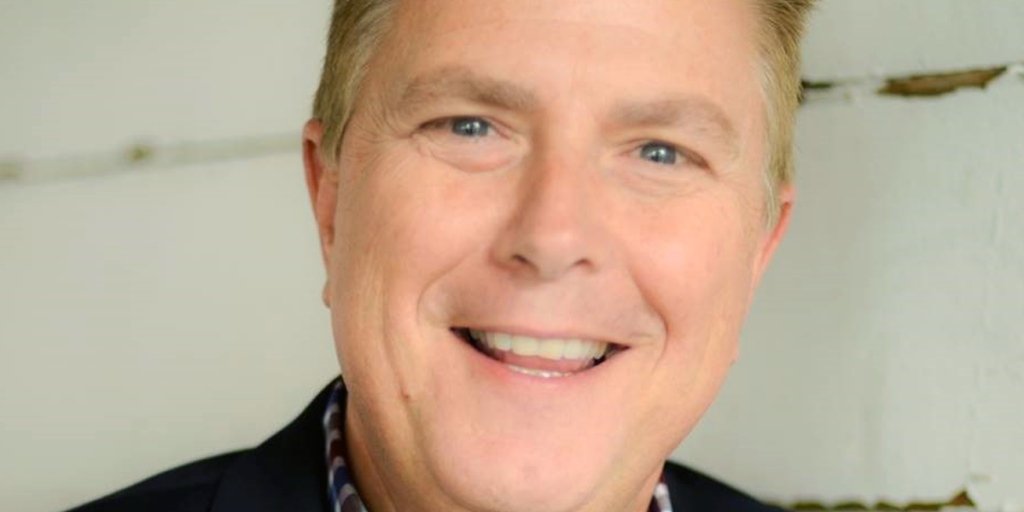
Republican gubernatorial hopeful and evangelist Scott Dawson said if people are surprised to see him running for governor, they are not alone. In a way, he is too. Dawson said he got in the governor’s race because he was tired of the state being embarrassed by corruption, noting the number of recent governors involved in scandals. He said he sees his newness to the political arena as an advantage, not a hindrance. “I’m one of us. I’m not a politician. The competitive advantage I’ve got is that everyone else is serving in office. I’m the one that’s been one of us for 30 years,” Dawson said. Dawson is one of three Republicans, along with Huntsville Mayor Tommy Battle and state Sen. Bill Hightower, challenging Alabama Gov. Kay Ivey in the June 5 Republican primary. Speaking at a lunchtime gathering at a senior center in Jasper, Dawson said some will argue the state needs a “seasoned politician” or a businessman as governor. “I am convinced more than ever before, Alabama needs a leader. Alabama needs someone who can cast a vision,” he said. Dawson, 50, is a native of Ensley and graduated from Samford University and Beeson Divinity School. He is the founder of the Scott Dawson Evangelistic Association. The organization, among other things, hosts youth and pastor retreats and large-scale Christian revival meetings. “I’ll go ahead and tell you I make decisions through a Biblical world view,” Dawson told the crowd in Jasper, adding quickly that he understands “we’re not creating a theocracy” and respects those of different beliefs. While trailing far behind in monetary donations, Dawson’s underdog campaign has been assisted by prominent friends made during his decades in ministry, and whose names he mentions in his campaign speech. He announced his intention to run on the Rick and Bubba Show, a syndicated morning radio show; has turned to former Arkansas Gov. Mike Huckabee for advice; and received donations from Hobby Lobby co-founders David and Barbara Green. Dawson said he supports legislation that would take Alabama “out of the marriage business” by doing away with probate judge-signed marriage licenses. He said he also supports the repeal of the Common Core curriculum standards and would like to implement mandatory drug testing for students seeking to be involved in extracurricular activities. Asked about education funding, Dawson responded that he thought the state has a “leadership issue” and not a “funding issue.” However, Dawson said he has declined to sign a no new taxes pledge. Dawson made the decision to run in early 2017, thinking that he would be running for an open seat. Instead, Ivey became governor after former Gov. Robert Bentley resigned in scandal. She is seeking a full term after a year of holding office. Dawson has criticized Ivey’s decision not to attend debates with her primary challengers, saying that she should be “vetted” for the position since she wasn’t previously elected governor. Ivey’s campaign has said she is focused on official duties, and that her record is open to voters and the media. Republished with the permission of the Associated Press.
Shelby County Board of Education to host Superintendent candidates’ forum
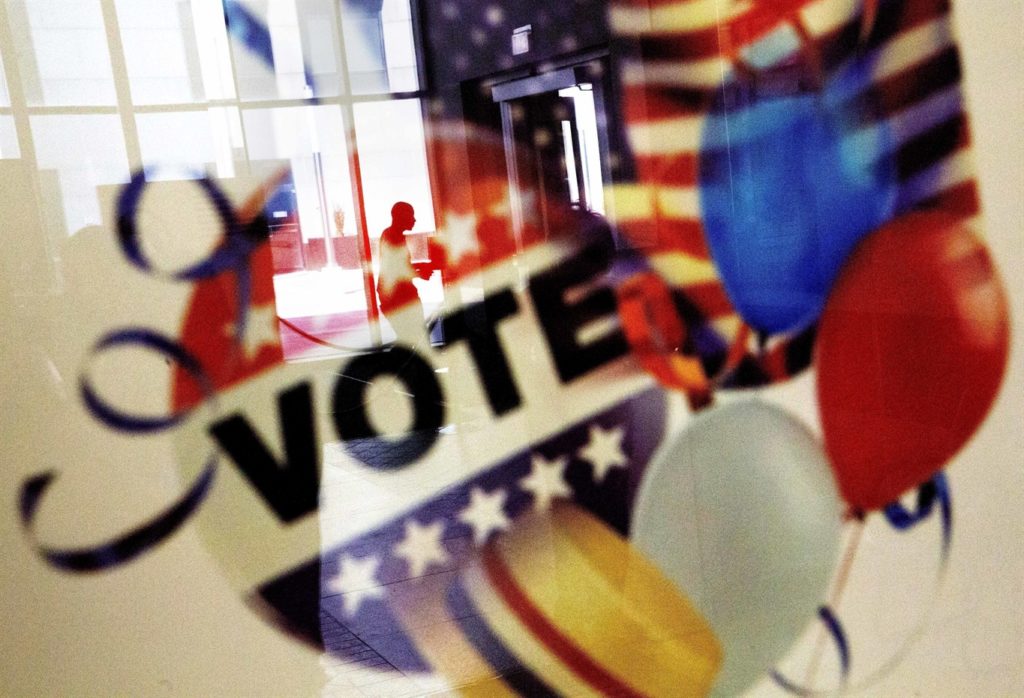
The Greater Shelby County, South Shelby County, Montevallo Chamber’s of Commerce and Shelby County Newspapers, Inc. will join forces to co-host a candidate forum for the Shelby County Board of Education Superintendent candidates on Thursday, May, 31. “On behalf of our partners for this Forum we’re looking forward to hosting this program,” said Kirk Mancer, President and CEO of the Greater Shelby County Chamber of Commerce. “All three of our chambers work collaboratively with schools throughout Shelby County, so having the opportunity to hear from the two candidates seeking this important leadership position was something we all wanted to do.” The forum will take place from at Jefferson State Community College’s Shelby-Hoover campus from 6:00 p.m. – 7:30 p.m.. Three-term current Superintendent, Randy Fuller, announced his retirement, effective in December in January of this year. Looking to fill his shoes is Assistant Superintendent of Administration Shelby County Schools, Dr. Lewis Brooks along with Oak Mountain High School Principal Kristi Sayer. Each of the candidates will have time to respond to questions determined by the three chambers. “The Superintendent for the Shelby County Board of Education oversees programming for 20,950+ students throughout all of our communities,” Keyla Handley, Acting Director for the South Shelby Chamber of Commerce said. “As the unified voice for Shelby County businesses — who will employ and work with these students in the future — it’s vital we hear from these individuals on career readiness efforts we’ll need moving forward.” “Our schools are the foundation of our communities,”Executive Director of the Montevallo Chamber of Commerce, Steve Gilbert commented. “This forum will allow everyone the opportunity to learn more about the platform the two candidates seeking to serve as Superintendent for the Shelby County Board of Education want to implement.” The candidates Dr. Lewis Brooks, current assistant superintendent of administration and pupil services for Shelby County Schools, Brooks has been a resident of Shelby County for the past 26 years. A graduate of the University of Montevallo, he also received his doctorate of education degree in 2010 at Samford University. “I decided to run for the position of superintendent of Shelby County Schools because, after many years of working in the district, I know the parents, educators and the staff here have such a high level of commitment to excellence in education for the students we serve,” Brooks told 280 Reporter. “I love that about this district and I share that same commitment.” Kristi Sayers, current Oak Mountain High School Principal has been an educator for 23 years. She received her master’s degree in educational administration and supervision from the University of Montevallo and a doctorate degree in educational leadership from the University of Alabama at Birmingham. “For too long, we’ve just kind of left the family out, and we all have to work together,” she told the 280 Reporter. “It’s not a one-size-fits-all. I think I have good ideas, and I’m not afraid to act on those ideas. My goal is always to move things forward.” The event is free to the public.
Alabama Book Festival attendees first to see state’s bicentennial children’s book

Attendees of the Alabama Book Festival at Montgomery’s historic Old Alabama Town on Saturday received a special treat: they were the first to see the brand new book, Alabama My Home Sweet Home, by Charles Ghigna. Ghigna, also known as Father Goose, is an award winning author who lives in Homewood, Ala. He wrote Alabama My Home Sweet Home as a bicentennial book for young readers; the book features a bear cub named Camellia who accompanies readers through the book as they come across famous Alabamians like Helen Keller, Rosa Parks and Jesse Owens during their own time and place in history. “We are thrilled to have a bicentennial book especially for young readers,” said Alabama Bicentennial Commission Executive Director, Jay Lamar. “What better time than the celebration of the state’s 200th birthday to introduce them to important Alabama people and places.” Another Alabama native, Michelle Hyde provided illustrations for the book. A graduate of the Ringling College of Art & Design, her work has appeared in The Birmingham News and several other publications. Hyde and her family reside in Birmingham. “It is even more special that Alabama My Home Sweet Home was written and illustrated by two people who call Alabama home,” said Lamar. “Father Goose is, of course, a beloved Alabama children’s writer. Michelle Hyde’s cheerful illustrations clearly show how well she knows the state. They make a great team.” Ghigna is the author of 5,000 poems and more than 100 books from publishers such as: Random House, Time Inc., Disney, Scholastic, and Highlights magazine. He is a former poet-in-residence and chair of creative writing at the Alabama School of Fine Art, who currently serves as an instructor for creative writing at Samford University.
Roy Moore, Luther Strange to go head-to-head in candidate forum
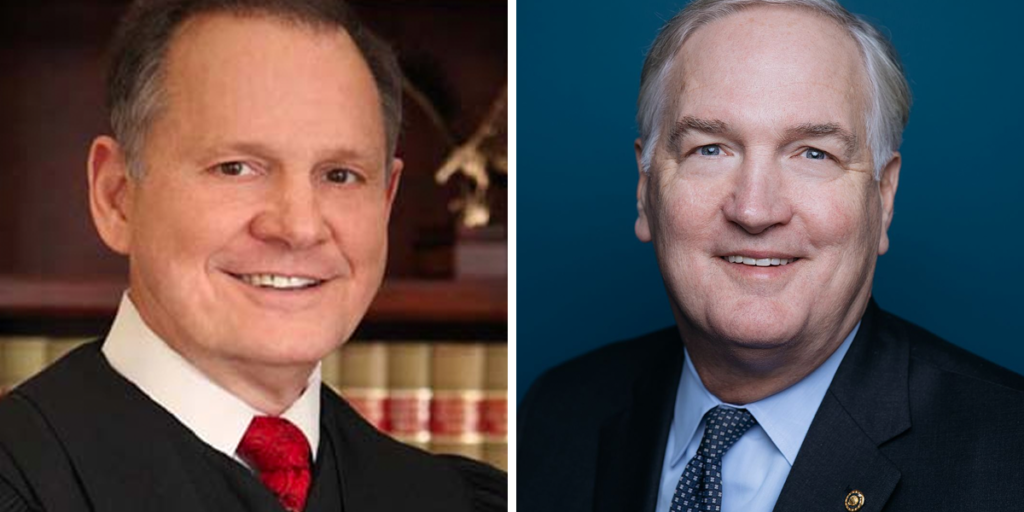
Former Alabama Chief Justice Roy Moore and Sen. Luther Strange are scheduled to go head-to-head in an upcoming candidate forum hosted by the Alabama Policy Institute and Samford University. The event will take place from 6:00 – 7:30 p.m. on the university’s Wright Center in Birmingham on Sept. 21, just days ahead of the Sept. 26 runoff election. Alabamians are invited to submit questions to the candidates via Twitter using the #AskAL. Cameron Smith, columnist for the Alabama Media Group, will moderate the event which is free and open to the public. Tickets may be reserved at AlabamaPolicy.org/Forum. The winner of the runoff election will advance to a Dec. 12 general election where they will face Democrat Doug Jones.
The sweet life: How an Alabama baker and blogger connects with her family on Lake Martin

The aroma of hazelnut cinnamon rolls and the sound of carefree toddler giggles fill the room while Kate Wood and her 2-year-old daughter, Aimee, stir homemade icing together. It’s a happy childhood memory in the making – the familiar scent of a mother’s cooking and the comfort that comes from being together in the kitchen. For Wood, an avid baker and the brains behind the popular baking blog Wood and Spoon, this is exactly where she belongs. On a springlike day, Wood has opened up her family’s Lake Martin home that has become a retreat for family members from across the country to gather, reset and spend time with one another. See Wood’s recipe for Meyer Lemon Cheesecake Food is one of the many ways Wood connects with others. Growing up the oldest of three, Wood has fond memories of her family dining together and spending time over food. The Orlando native moved to Alabama to attend Samford University, where she majored in nutrition. She met her future husband, Brett, in the cafeteria at the University of Alabama at Birmingham, where she was earning a master’s degree in clinical nutrition and he was finishing his residency in orthodontics. While Wood says she started to develop her love for food and science in early college days, it wasn’t until her wedding that she discovered her passion for baking. Inspired by her mother, Wood set out to make her own wedding cake. “My mom and her friend had an old pasta maker and they made their own fondant. I thought, if she can do it, I can do it. I probably made 30 different vanilla cake recipes that year,” Wood said with a laugh. Making her wedding cake revealed that her love of food and science were a perfect pair when it came to baking. “Baking is really just one big science project,” she said. The recipe lab Wood and her husband now live in his hometown of Selma with their two children, Aimee and George. For the big-city transplant, Wood has taken to the closeness of a small town. “Life in a small town is so rich. People truly care about each other, we are all sewn together and you realize how your life affects others,” she said. After her wedding cake success, Wood has continued to bake and has a dream of creating a cookbook of her own. She started Wood and Spoon to document her recipes and journey through baking. “It was scary at first to put yourself out there and trust that what you have to say is meaningful. But this is a passion that God has put in my heart. We all have goals, and I want this to be full; it’s a labor of love.” See Wood’s recipe for Honey Oat Bread Inspiration for a new recipe seemingly waits at every corner for Wood. “I get ideas traveling, looking at a restaurant menu or even just seeing an item at the grocery store,” she said. “I keep a running list of ideas and just see where the inspiration strikes me when testing recipes.” Using her food science background, the recipe development process can take a few short days or can stretch weeks at a time. “I made easily 40 loaves of cinnamon bread before I was happy with it,” she recalled of a recent recipe. Love and baking More than her passion for nutrition and food, Wood embraces the opportunity baking offers to spend time with her family and to connect with her loved ones. “At the end of my life, I want my children to look back and know their mom loved them and loved baking. That they have memories of us being in the kitchen together and that this could create a special way for us to spend time together,” she said. As Aimee dips her fingers into the freshly iced cinnamon rolls she helped make, it’s obvious that she is developing a love for baking with her mom. “I think a love of food and sitting down to share a meal together will always be part of how our family connects,” Wood said. This love for food and connection stretches beyond sharing a meal with her family. “Most of the time, even I don’t get to eat the treats Kate has made for the blog,” her husband said with a laugh. Instead, Wood gives them to neighbors, friends and colleagues to share. “It’s a way to show people you love them. And it’s a joy to be able to do those things, to love people and show them you care,” Wood said. A restful place Lake Martin has become another way Wood and her family connect. When Wood was at Samford, her Florida-based parents bought a second home on the lake. “I loved Alabama, and once my parents came and saw Lake Martin, they decided to settle at the lake instead of in the mountains of North Carolina.” For their family, it’s a great way for family members from across the country to come together. Wood’s parents and younger siblings now spend their summers on Lake Martin. Her grandparents from Michigan have relocated permanently just down the street in a community on the lake. “Everyone found a home at the lake,” Wood said. “It’s our rest place.” See Wood’s recipe for Trail Mix Cookies At the lake, there is something for everyone. Wood’s grandfather, a carpenter, helped remodel the family lake house, building cabinets, doors and built-ins. Another shared passion of the women of the family is quilting, so much so that the lake home boasts its own quilting room. “We spend so much time quilting at the lake – my mom, my grandmother, my sister, the babies. There are quilts all over this house that we have made. It’s just another way that we are able to spend time together,” Wood said. As Aimee and George play on one of their many family quilts, Wood shares her dreams of the lake house
Samford students rack up more than 900,000 hours of community service during 2015-16
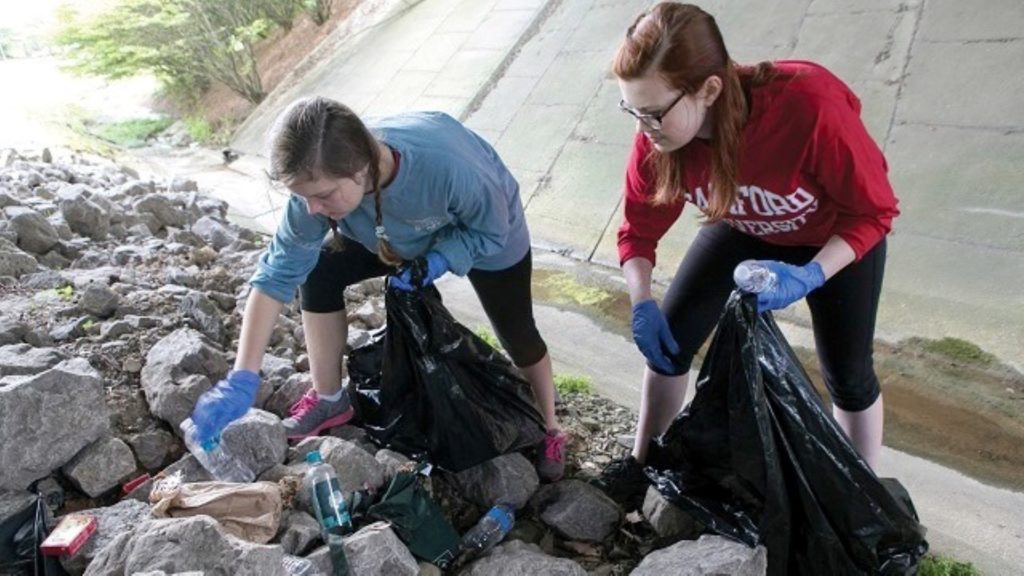
At Samford University, community service is not just part of the culture; it’s actually built into the curriculum. And Samford students’ already substantial involvement in community work at home and abroad continues to grow significantly, based on the annual Community Engagement and Impact Report the university began compiling three years ago. According to the latest report from the Frances Marlin Mann Center for Ethics and Leadership, Samford undergraduate and graduate students during the 2015-16 academic year performed 927,192 hours of off-campus community engagement work in a wide range of fields. That figure represents a 29 percent increase from the previous year. “Community engagement is simply part of the university’s DNA,” said Mann Center director Drayton Nabers. “The experiences of students when engaged in community work will stay with them for a lifetime.” This year’s report is the most detailed yet. While continuing to quantify students’ curricular and cocurricular community work, it contains additional information from the university’s 10 schools, colleges and multiple campus units that more fully reflects the mutual benefit of community engagement for students and communities. The total value of the students’ community work last year was $21.4 million, based on the estimated value of volunteer time according to Independent Sector. That total consisted of 608,584 academic service hours tied directly to classes and an additional 318,609 service hours through cocurricular activities. Neither Samford nor its students received any reimbursement for these services. “We hope this year’s report will inform a common university vision and community engagement strategy,” said Allison Heidbrink Nanni, Samford’s director of community engagement. With more than 295 courses that integrated community engagement as an academic component, Nanni said the university worked with hundreds of community partners and other nongovernment organizations around the world that span initiatives in the arts, ministry, athletics, youth services, education and legal fields, environmental justice, and the health care industry, to name a few. “Measuring impact can be difficult,” Nanni admitted. “Our hope is that the findings drive our day-to-day decisions. We want to leverage Samford’s human and financial resources to maximize benefit both for our students and for the citizens living in the broader region and around the world.” Examples of community engagement initiatives during 2015–16 included: Brock School of Business students assisted Birmingham’s Christian Service Mission to build a house in a marginalized area of Birmingham through an economics and poverty studies course. Interior architecture students integrated faith and scholarship to design a medical clinic in India through Design Education for World Impact. First-year law students donated 430 service hours in several Birmingham nonprofit agencies during orientation through the Cumberland Public Interest Project. Graduate students in the university’s new Doctor of Physical Therapy program served on a medical mission trip to the Dominican Republic. Samford’s overall economic impact on the region is $335 million. Republished with permission of Alabama NewsCenter.


